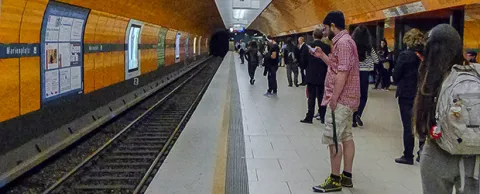
Urban planning is often an exercise in extrapolation. We extend current trends to guess where they will be in the future. But that may not work for traffic planning, at least according to a survey of Boston professionals. The younger generation doesn't want to drive, it turns out.
If that's true, you may need fewer streets but more mass transit. And here's another important finding — roughly half of the people surveyed are willing to move to a new city to get better transit options. — Jesse Berst
Most American teens look forward to the day when they turn 16 so they can finally get their driver’s license. But they don’t appear to show much interest in using it.
A new survey of Boston’s youngest professional workers finds the vast majority want to live somewhere where they rarely have to drive. The study provides hope for cities that are struggling to find ways to reduce traffic congestion in the face of swelling populations: If you build an effective transit system, they will use it.
But it also shows that while these young workers are among transit’s biggest fans, buses alone don’t meet their needs. What the city puts within their easy reach is also critically important.
Transit ranks above everything else
Public transit is more important than any other factor when it comes to deciding where to live, according to the Urban Land Institute Boston/New England and MassINC Polling survey. Some 80% rated public transit access as “very important,” the highest level.
Graphs showing where they live and work are remarkably similar. Fewer than a third drive to work — 26% drive solo, 6% carpool. The subway, buses and even walking were the top means of commuting.
When it comes to employment, proximity to transit has, by far, the biggest impact on their job satisfaction. Some 78% say it’s very important. That’s more than double the number of people who said proximity to dining and nightlife or in-office amenities. And it’s quadruple the number of people who said an open work environment matters.
They want it all within easy reach
They also want neighborhoods that they don’t really have to leave — or at least are easy to leave when they have to. The three most desirable attributes all relate to getting around. Ease of commute, transit access and amenities you can walk to were all rated very important by at least three-quarters of the millennials surveyed.
In contrast, only a quarter cared about on-street parking, and even fewer than that mentioned bike lanes. Even public safety was only very important to just over half the respondents.
Boston is not alone
Before you dismiss this study as something that’s unique to Boston, other studies find what’s happening there is happening everywhere.
The Rockefeller Foundation and Transportation for America last year surveyed millennials in 10 cities in three transit tiers. It looked at cities like New York and Chicago where the transit systems are mature, cities like Denver and Charlotte where they are growing, and cities that are getting started, like Nashville and Indianapolis.
There was little variation in its results: four out of five say transit access is very important to them. In fact, more than half said they would look at moving to a different city if it offered better transit. Cities with industries that require a young, well-educated workforce need to make sure they’re attractive to those workers.
More stories …
Future of mobility? It depends who you ask
What Zipcar can teach you about millennials (and why you should pay attention)
How a team of IBM millennials helps a campus connect



